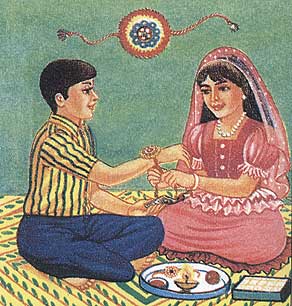
History Of Rakhi Celebration
******************************
(with some images of beautiful gold Rakhis)
Rani Karnawati and Emperor Humayun
One of the earliest origins of Raksha Bandhan in documented history can be traced to the medieval era. During this period the Rajputs were fighting Muslim invasions. Rakhi at that time was a spiritual symbol associated with protection of the sister. History has it that when Queen Karnawati the widow of the then King of Chittor realised that she could in no way defend the invasion of the Sultan of Gujarat, Bahadur Shah, she sent a rakhi to Emperor Humayun. The Emperor touched by the gesture, accepted the rakhi thereby accepting Queen Karnawati as a "sister" and immediately started off with his vast troops to protect Queen Karnavati.

Alexander The Great and King Puru
One of the oldest legendary references to the festival of Rakhi goes back to 300 B.C. At this time Alexander the Great, was invading India. Alexander was shaken by the fury of the Indian king Puru in his first attempt. Upset by this, Alexander's wife, who had heard of the Rakhi festival, approached King Puru. King Puru accepted her as his sister and when the opportunity came during the war, he refrained from fighting Alexander. In the war, when Alexander fell from his chariot and King Puru was about to slay him, King Puru saw the rakhi on his wrist and he drew his sword back.

The History of Raksha bandhan
There are many references to the significance of the Rakhi festival in Vaishnava Theology.
Vritra-Indra
The origin of this festival is usually traced back to the historical incidents of Indra's fight with Vritra-Indra that resulted in Indra's loss. Then, his wife had tied a thread around his wrist and empowered it with divine powers to make sure Indra emerged victorious in the duel that followed.

Krishna and Draupadi
Another incident is the one that concerns Krishna and Draupadi, the wife of the Pandavas. She had torn a strip of silk off her sari and tied it around Krishna's wrist to stop the flow of blood Krishna was so touched by her action that he found himself bound to her by love. He promised to repay the debt and then spent the next 25 years doing just that. Draupadi in spite of being married to 5 great warriors and being a daughter of a powerful monarch only trusted and depended wholly on Krishna.

King Bali and Goddess Laxmi
According to another legend the Demon King Bali was a great devotee of Lord Vishnu. Lord Vishnu had taken up the task to guard his kingdom leaving his own abode in Vaikunth. Goddess Lakshmi wished to be with her lord back in her abode. She went to Bali disguised as a Brahmin woman to seek refuge till her husband came back.
During the Shravan Purnima celebrations, Lakshmi tied the sacred thread to the King. Upon being asked she revealed who she was and why she was there. The king was touched by her goodwill for his family and her purpose and requested the Lord to accompany her. He sacrificed all he had for the Lord and his devoted wife.
Thus the festival is also called Baleva that is Bali Raja's devotion to the Lord. It is said that since then it has been a tradition to invite sisters in Shravan Purnima for the thread tying ceremony or the Raksha Bandhan

Yama and the Yamuna
According to another legend, Raksha Bandhan was a ritual followed by Lord Yama (the Lord of Death) and his sister Yamuna. Yamuna tied rakhi to Yama and bestowed immortality. Yama was so moved by the serenity of the occasion that he declared that whoever gets a rakhi tied from his sister and promised her protection will become immortal.
Key Words : rakhi celebration , rakhi designs , gold rakhi , yama and the yamuna , king bali and goddess laxmi , krishna and draupadi , rakhi photos , rakhi images , rani karnavati and king humayun ,Alexender the great and king puru ,

0 comments:
Post a Comment